
84% of the world’s coral reefs hit by worst bleaching on record
The world is facing its 4th and largest global coral bleaching event, with a staggering 84% of the world’s coral reefs being impacted, according to recent reports from scientists. This unprecedented event has seen coral bleaching documented in at least 83 countries and territories from January 1, 2023, to April 20, 2025.
Coral bleaching occurs when corals are stressed by rising sea temperatures, which causes them to expel the algae that live inside their tissues, known as zooxanthellae. This leads to a loss of their vibrant colors and a white, skeletal appearance, hence the term “bleaching.” While coral bleaching can occur naturally, it has become a more frequent and severe issue due to the rapid warming of the world’s oceans.
The current bleaching event is not only the largest on record but also the most widespread. During the 3rd global coral bleaching event from 2014-2017, 68.2% of the world’s coral reefs were impacted. This increase in the severity and extent of coral bleaching is a clear indication of the devastating impact of climate change on the world’s coral reefs.
The 4th global coral bleaching event has had a significant impact on coral reefs around the world. Many reefs have experienced severe bleaching, with some areas suffering from catastrophic losses. For example, the Great Barrier Reef in Australia, one of the most biologically diverse ecosystems on the planet, has experienced its worst coral bleaching event on record. The reef’s northern section, which is home to over 1,500 species of fish, has seen a staggering 90% of its coral cover bleached.
The consequences of coral bleaching are far-reaching and have significant implications for the environment, economies, and human communities that rely on coral reefs. Coral reefs provide a range of ecosystem services, including shoreline protection, nursery habitats for fish, and carbon sequestration. They also support commercial fisheries, tourism, and recreation, generating billions of dollars in revenue each year.
However, the impact of coral bleaching goes beyond the economic and environmental benefits. Coral reefs are also critical to the livelihoods of millions of people around the world. In many coastal communities, coral reefs provide a source of food, income, and cultural identity. The loss of coral reefs can have devastating social and economic consequences, including food insecurity, poverty, and displacement.
The 4th global coral bleaching event is a stark reminder of the urgent need for action to address the root causes of coral bleaching. Rising sea temperatures, driven by climate change, are the primary cause of coral bleaching. Therefore, reducing greenhouse gas emissions and mitigating the effects of climate change are critical to preventing further coral bleaching events.
In addition to addressing climate change, there are several other steps that can be taken to reduce the impact of coral bleaching. These include:
- Reducing pollution: Pollution from land-based activities, such as fertilizers and sewage, can contribute to coral stress and increase the susceptibility of corals to bleaching.
- Protecting coral reefs: Establishing marine protected areas and reducing human impact on coral reefs can help to reduce the pressure on corals and promote their recovery.
- Promoting sustainable tourism: Responsible tourism practices, such as avoiding coral damage and supporting local communities, can help to promote the conservation of coral reefs.
- Supporting coral reef restoration: Corals can be restored through coral nurseries, reef reconstruction, and other methods. This can help to accelerate the recovery of damaged reefs and promote the long-term health of coral ecosystems.
In conclusion, the 4th global coral bleaching event is a wake-up call for the world. It highlights the urgent need for action to address the root causes of coral bleaching and to protect the world’s coral reefs. While the situation is dire, it is not too late to take action. By reducing our impact on the environment, promoting sustainable practices, and supporting conservation efforts, we can help to ensure the long-term health of coral reefs and the ecosystems they support.
News Source:
https://repository.inshorts.com/articles/en/PTI/5d418c3c-761b-403e-a753-c13d578ac918






